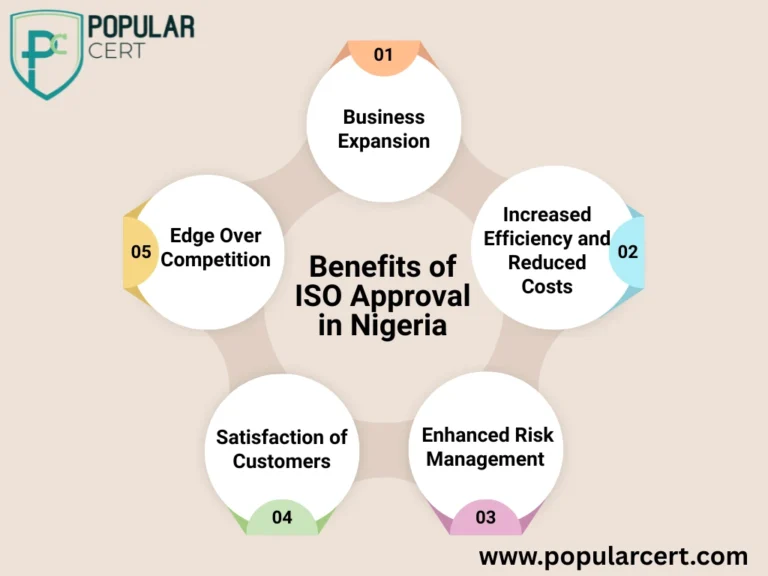ISO Approval Certification in Nigeria: Process, Standards & Key Benefits

Introduction
In the current business environment, having credibility and trust that accompany the products and services you provide, is essential. For businesses in Nigeria that want to penetrate and position themselves in the local and international space, getting ISO approved helps to showcase assurance of quality, compliance, and trustworthiness.
ISO (International Standard Organization) certifications in Nigeria do not only serve as a document issued to your business. It is a stamp of operational success, uniform business output, and compliance with international benchmarks. It does not matter if you are a startup in Lagos, or a big industrial concern in Port Harcourt, wezz; ISO certification opens gateways to greater business prospects.
As one of the most renowned ISO consulting companies in Nigeria, Popularcert with the help of advanced technology, has assisted customers from diverse sectors in obtaining ISO approval in a timely and effective manner. This document will explain the meaning of ISO approval, its significance, the certifying steps, and how Popularcert can support you at every stage.
What is ISO Approval?
ISO approval is a stamp of trust that your organization has adhered to the requirements of the specific ISO standard. This trust is issued when an external certifying agency audits and validates your organization’s processes, systems, and policies to best practices that confirm international standards.
Many people often confuse the phrases “ISO approval” and “ISO certification”. In this case, approval is more of an acknowledging an entity has met the necessary requirements, in this case, the business processes complied with the necessary standards needed. It is an invaluable asset in demonstrating compliance for quality assurance, risk management, and customer satisfaction.
Why ISO Approval Matters for Businesses in Nigeria
- Enhances Credibility & Trust
ISO approval safeguards organizations and individuals for the business under well-defined and documented processes. This assurance of credibility is often very crucial in winning the business and even in the competition for the value-added service customers.
- Improves Operational Efficiency
With the focus on process streamlining, ISO standards help in the minimization of mistakes, increased productivity, and an improvement in quality consistency in the business operations.
- Regulatory Compliance
In some sectors in Nigeria, such as the food, health, and construction, compliance to certain requirements is mandatory. This is why approval from ISO is very important since it ensures compliance with local requirements and international standards.
Popular ISO Standards for Approval in Nigeria
Types Of Certification
- ISO Certification
- ISO 9001 Certification
- ISO 14001 Certification
- ISO 45001 Certification
- ISO 22000 Certification
- ISO 27001 Certification
- ISO 17025 Certification
- ISO 13485 Certification
- ISO 20000-1 Certification
- ISO 22301 Certification
- ISO 50001 Certification
- ISO 37001 Certification
- IATF 16949 Certification
- ISO 29001 Certification
- ISO 31000 Certification
- ISO 20121 Certification
- ISO 10002 Certification
- ISO 41001 Certification
Get Free Consultation
Our Clients


















Depending on your sector and objectives, ISO approval Certification can pertain to different standards. In Nigeria, some of the most popular are:
ISO 9001 – Quality Management System (QMS)
Ensures consistent quality, customer satisfaction, and efficient processes.
ISO 14001 – Environmental Management System (EMS)
For organizations that are committed to sustainable operations and environmental compliance.
ISO 45001 – Occupational Health and Safety Management
For businesses prioritizing workplace safety and the wellbeing of employees.
ISO 22000 – Food Safety Management System
For companies participating in the food production, processing, and distribution phases.
ISO 27001 – Information Security Management System
For organizations focusing on sensitive information and cyber risks.
ISO Approval Certification Process in Nigeria
There are steps that must be taken in achieving ISO approval, this one in particular requires thorough planning:
Step 1 – Gap Analysis
This is the first step in the proposed sequence where a complete assessment of your existing processes to determine where you meet or do not meet ISO requirements.
Step 2 – Documentation & Implementation
This is the creation and adaptation of organization policies, SOPs, manuals, and records in the ISO standard set requirements.
Step 3 – Internal Audit
This is where you confirm that the implemented changes are in place for evaluation.
Step 4 – Certification Audit
Your organization undergoes an audit carried out by an accredited certification body which checks the systems and processes of your organization against the ISO standard.
Step 5 – Approval & Maintenance
Upon successful completion of the audit, the ISO approval certificate is issued. To retain it, periodic surveillance audits must be carried out.
Benefits of ISO Approval in Nigeria

- Business Expansion – Aids in winning new contracts and gaining access to foreign markets.
- Increased Efficiency & Reduced Costs – Improved processes minimize waste and enhance productivity.
- Enhanced Risk Management – Operational and compliance risks are pinpointed and controlled.
- Satisfaction of Customers – Better quality fosters deeper trust and loyalty.
- Edge Over Competition – Distinguishes your business from the uncertified rivals.
How Popularcert Helps You Achieve ISO Approval
Popularcert is a reputable ISO consulting firm in Nigeria known for helping businesses secure ISO approval. Their strategies are customized to fit your business sector, size, and objectives.
- Specialist Consultation – Under the brand, specialists conduct in-depth evaluations for your business.
- Comprehensive Assistance – Every activity, starting from documentation to final audits, is carried out accurately and meticulously.
- Knowledgeable Industries – Works in manufacturing, services, healthcare, food, IT, and others.
- Confirmed Reputation – A large number of businesses, large and small, in Nigeria have been granted approval.
With Popularcert, everything runs smoothly, efficient, and stress-free—in a way that lets you focus on managing your business and lets them take care of the rest.
Common Challenges & How to Overcome Them
- Misunderstanding ISO Requirements – They give proper explanations and training, thus resolving the issue.
- Resistance to Change – Practical workshops encourage teams to adopt the new systems willingly.
- Limited Resources – Practical and affordable ways to implement them is provided by Popularcert.
- Documentation Gaps – Your records are kept to standards by the use of set templates and expert advice.
Conclusion & Call to Action
ISO approval Certification does more than grant a certification—it transforms your business. It expands local and global access for companies in Nigeria, strengthens compliance, and improves trust among customers.
If Popularcert is your consulting partner, you would have access to a seamless path to ISO approval with their tried and tested methodology and expert guidance. They are ready to guide you with Popularcert for ISO 9001, ISO 14001, ISO 45001, ISO 22000, or ISO 27001, and help ensure you meet the standards and outshine your competitors in the industry.
Contact Popularcert and set your business on the path to excellence to gain a competitive edge in the market.
GET A FREE CONSULTATION NOW
FAQs
What is the difference between ISO approval and certification?
ISO approval is the compliance determination with an ISO standard, whilst certification is the verification that documented proof is issued, often through an audit.
What is the timeline for ISO approval in Nigeria?
The timeline is unique for each organization because of the company processes, the standard selected, and the audits that need to be conducted.
Are small businesses ISO approved?
Organizations of any size and type can benefit from ISO Approval. These approvals enhance credibility, operational efficiency, and compliance with regulations.
Does ISO approval have international recognition?
Absolutely. Once issued by an accredited body, your approval is accepted everywhere.
What should be done to sustain the ISO approval status?
Maintaining ISO approval status is accomplished through periodic surveillance audits, ongoing improvements, and compliance with the standard.
